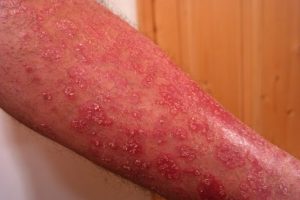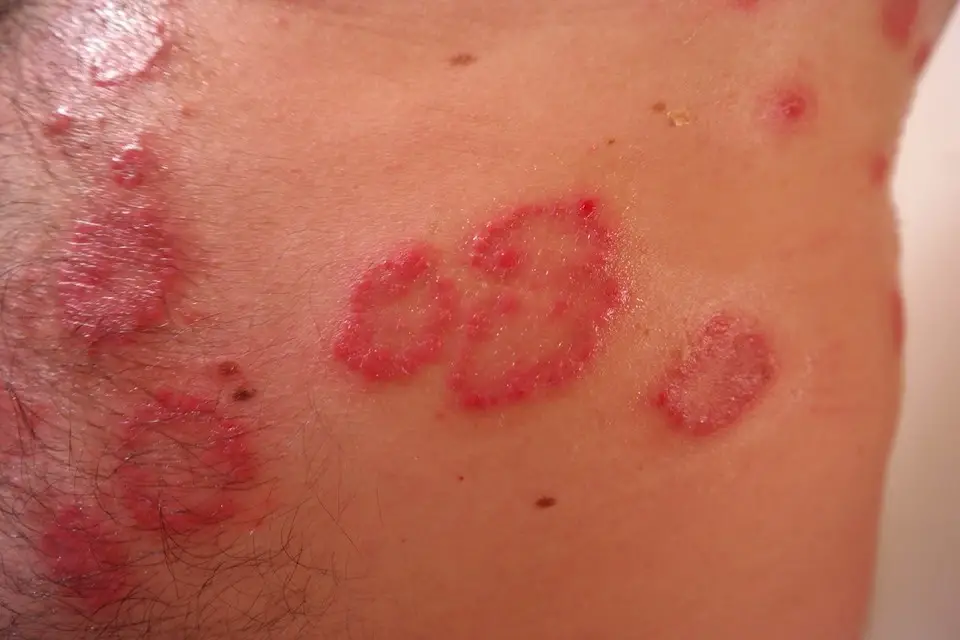Did you know that 2 to 3 percent of the entire world population has psoriasis? It’s an autoimmune disease that’s directly affected by what you eat. So is a plant-based diet good for psoriasis?
In the US alone, over 8 million people have psoriasis. It’s a condition that affects the person not only physically but also emotionally, even causing social anxiety. As a skin disorder, it can be painful to manage, and reduce the quality of life.
But there’s a way out of it, and it starts with your diet. We already know that some foods trigger psoriasis, but studies also suggest some foods can help manage psoriasis symptoms. It may even be possible to go into remission simply by changing your diet.
What is Psoriasis?
Psoriasis is a skin condition where the skin gets red, scaly patches that often are itchy. It’s a chronic autoimmune disease that’s caused by the body’s own immune system attacking cells.
Basically, the skin cells multiply ten times faster, resulting in thick patches that are bumpy and scaly. It can happen on any part of your skin, including knees, scalp, arms, elbows, and lower back.
Since it’s a chronic disease, it lasts a lifetime. However, that does not mean you’ll live with the symptoms at all times. In fact, psoriasis flares happen in cycles. Also, it’s different for each person, as some people may have severe flare ups, resulting in bleeding as well.
Type of Psoriasis
While the symptoms are similar for almost all the psoriasis types, where it occurs can be different. Also, all the psoriasis types have a similar cyclic nature, where symptoms occur for a few weeks to a few months.

Here’s a list of the different types of psoriasis:
- Plaque psoriasis
- Nail psoriasis
- Inverse psoriasis
- Guttate psoriasis
- Erythrodermic psoriasis
- Psoriasis arthritis
- Pustular psoriasis
Psoriasis Risk Factors and Triggers
Psoriasis is an autoimmune disorder where the immune system attacks perfectly healthy body cells. We don’t know exactly what causes the immune system to behave like this. However, there are some risk factors that perhaps increase the risk of psoriasis.
Family History
Your family history may directly affect your chances of developing psoriasis. If a close family member has psoriasis, your risk is higher too. The fact that psoriasis runs in families indicates that it could be genetic as well.
Psoriasis Triggers
If you have psoriasis, you have to avoid things that may be a trigger. While psoriasis flare ups can occur on their own, certain environmental factors can also cause or accelerate them. These triggers include:
Stress
Does stress cause psoriasis? Stress is both a risk factor and a trigger. Those who have high levels of stress increase their risk of getting psoriasis.
On the other hand, those already diagnosed with the condition may find stress to cause flare ups. Unusually high stress can cause the immune system to act up and cause symptoms of this chronic condition.
Smoking
Smoking is yet another risk factor and trigger. Not only can it cause it in the first place, but it can make the disease worse. Even secondhand smoke can trigger severe breakouts of psoriasis.
Many studies have linked tobacco with psoriasis, cautioning both smokers and non-smokers. The same paper indicates that a lot of the comorbidities of psoriasis also have smoking as a risk factor.
Infections
Certain types of psoriasis can get worse if you have an infection like a strep throat. This is mainly because your immune system is already weak. Viral and bacterial infections can both trigger psoriasis flare ups.
Weather
Dry and cold weather is the worst for people with psoriasis. It already makes normal skin dry, but in psoriasis, the effects can be even more extreme. It’s imperative that you keep the skin dehydrated and moisturized at all times.
Sun Exposure
Similar to the weather, direct sunlight can also cause flare ups related to psoriasis. If you stay in the hot summer sunlight for a long time, it will likely trigger your psoriasis or make it worse if you already have it active.
Interestingly, for some people, the effect is the opposite. Sunlight may help control the symptoms, but you should speak with a medical advisor about this.
Unhealthy Lifestyle
An unhealthy lifestyle marked with poor diet choices can also increase the risk and cause triggers in those already diagnosed with psoriasis. Heavy alcohol consumption, smoking, eating a lot of processed foods, and not exercising enough can all contribute to the onset of this chronic disease.
A South Korean study also linked obesity with psoriasis, accepting it as a risk factor. According to the National Psoriasis Foundation, research shows that obesity in adolescents increases the risk of them developing psoriasis later in life.
Is a Plant-based Diet Good for Psoriasis?
Although more research needs to be done, existing evidence in the form of studies and real-life examples shows that a plant-based diet can help people with psoriasis.

Psoriasis is a chronic disease, something you have to live with. So it’s all about managing the symptoms. Your diet can help reduce the itchy, scaly, red patches of skin. Similarly, it can also prevent future flare ups from occurring.
The main benefit when it comes to a plant-based diet is its anti-inflammatory effect. As we already know, certain foods in the plant-based diet can help reduce inflammation for autoimmune diseases like arthritis. It can also help control the symptoms of psoriasis, especially psoriasis arthritis.
There aren’t many studies that have studied the direct effect of a plant-based diet on psoriasis. However, one study focused on the effects of a Mediterranean diet. This diet includes a lot of plant-based foods, but it also involves fish and some other lean proteins.
This study, published in the Journal of Translational Medicine, confirmed the beneficial effects of a Mediterranean diet. That partly confirms that plant-based foods do, in fact, help to control the symptoms of psoriasis.
Another aspect to consider is weight management. There’s a lot of evidence that suggests that plant-based and vegan diets may be the best way to lose weight and keep it healthy. This is quintessential for patients with psoriasis, as obesity is linked with both the development and severity of the disease.
If you’re already obese and have psoriasis, you can lose weight by strictly adhering to a plant-based diet. Not only will it improve your overall health, but also dramatically reduce your psoriasis flare ups.
Similarly, patients with psoriasis who are not overweight can prevent obesity and prevent their psoriasis from getting worse by sticking to a whole foods plant-based diet.
Plant-based Foods That Are Good For Psoriasis
Is a plant-based diet good for psoriasis? When making the switch to a plant-based diet, you want to focus more on certain food groups. These foods, in particular, will help you manage your psoriasis symptoms, and take back control of your life.
Fruits and Vegetables
Fruits and vegetables are anti-inflammatory in their very nature. Most anti-inflammatory diets include fresh fruits and vegetables.
Of course, certain vegetables are even more anti-inflammatory than others. These include broccoli, garlic, ginger, leafy greens, and Brussel sprouts.
Similarly, some fruits also have anti-inflammatory effects. Citrus fruits and berries are great for fighting inflammation, so they can help with psoriasis as well. You should include at least a single serving of fresh fruits in your daily diet.
Potassium-Rich Foods
Potassium-rich foods can be quite beneficial in managing and treating autoimmune diseases like arthritis and psoriasis. This NutritionFacts.org video explains why and how potassium-rich foods can help with autoimmune diseases.

The key players in this scenario are glucocorticoids that have been known to suppress inflammation. Potassium-rich foods cause the adrenal glands to produce more of these glucocorticoids.
Potassium is such a dire need of our body as we need at least 3000 mg of it daily, according to Dietary Guidelines for Americans. However, a whopping 98% of Americans eat potassium-deficient diets.
So what foods are rich in potassium? There’s a whole variety of them:
- Bananas
- Oranges
- Cooked spinach
- Cooked broccoli
- Leafy greens
- Peas
- Mushrooms
- Cucumbers
- Zucchini
Healthy Oils
Some vegetable oils contain healthy fatty acids that have anti-inflammatory properties. You can find heart-healthy oils from plant-based sources as well. You’re looking for oils with high ratios of omega-3 to omega-3 fatty acids.
You should include the following oils in your diet for psoriasis:
- Olive oil
- Flaxseed oil
- Coconut oil
- Safflower oil
These oils have benefits beyond reducing inflammation. As heart-healthy oils, they will also reduce the risk of heart disease.
Spices and Herbs
Some spices and herbs can also reduce inflammation and reduce cell degeneration, thanks to the antioxidants in them. These spices include cinnamon, peppermint, and turmeric.
You should also add some anti-inflammatory herbs to your diet like oregano, thyme, and sage.
Foods to Avoid
One of the reasons why a plant-based diet is inherently good for psoriasis is that it’s devoid of animal products like meat and dairy. Both meat and dairy products have been associated with psoriasis, as causing lesions.
Meat, eggs, and dairy products contain arachidonic acids, which are basically polyunsaturated fats. Research has shown that these acids can worsen psoriasis, and are, therefore, part of the trigger foods.
According to several studies, people with psoriasis are also at risk of getting celiac disease. The celiac disease creates intolerance to gluten, a protein found in some plant-based foods as well. Therefore, it’s important to stick to a gluten-free plant-based diet if you have psoriasis.
Wheat, barley, rye, and graham flour all contain gluten. Oats, on the other hand, are gluten-free whole grains.
Some vegetables are also psoriasis triggers. The nightshade family plants have been known to increase inflammation. The main compound behind this is solanine, which is found in tomatoes, eggplants, potatoes, and peppers.
Can Psoriasis Go Away?
Psoriasis is a chronic condition, which means that once you have it, you may not be able to cure it. However, it’s possible to make psoriasis symptoms go into remissions. What this means is that your symptoms may disappear and may not come back, until, of course, triggered by one of the triggers.

Your diet can play an extremely important role in psoriasis remissions. While there aren’t many studies proving this, we have seen success stories from people who switched to a plant-based diet. The story of one psoriasis arthritis patient is a glimmer of hope for many following a whole-food plant-based diet.
In order to see positive results, you really have to commit to these lifestyle changes. You should stay away from smoking and alcohol. Physical activity can also help balance your overall health, keeping psoriasis in check.
Usually, topical medication can help with controlling flare ups and getting rid of the itch. However, your goal should be to send psoriasis into remission, so you stop needing the steroids at all.
Keeping your skin moisturized and hydrated is also equally important, as dry weather can cause dry skin, activating psoriasis. Drink plenty of water during the day to keep the skin and body hydrated.
FAQs
Is Psoriasis Contagious?
Psoriasis is not a contagious disease. You don’t get the disease by touching someone who has psoriasis. It does run in the family, though, so your chances of getting it are higher if someone in your family has it.
Is Psoriasis Genetic or Environmental?
Psoriasis is both genetic and environmental. However, there’s a strong inclination towards genetics playing a bigger role. That said, most psoriasis triggers are, in fact, environmental. These include dry weather, sunlight, smoke, and some inflammatory foods.
Is Psoriasis Deadly?
Psoriasis, in general, is not a deadly disease. However, erythrodermic psoriasis is the most severe and can be life-threatening as well.
Even though this skin condition is not deadly, it can affect the quality of life. People with psoriasis may suffer from social anxiety and emotional trauma because of their skin condition.
Wrap Up
Is a plant-based diet good for psoriasis? Existing scientific evidence and the proven anti-inflammatory benefits of a plant-based diet seem to prove so. However, there’s a need for more research and awareness about this.
Psoriasis may be a chronic disease, but it’s possible to manage it. The least you can do is keep it from getting worse by sticking to a diet that works in your favor.
You may also like: IS A PLANT-BASED DIET GOOD FOR ACNE? >>CLICK HERE!










